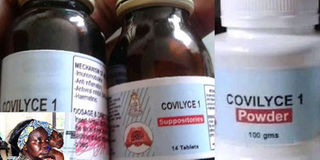How Gulu University team created Covilyce-1

Covylice-1 drug and it's ead developer, Dr Alice Lamwaka (inset).
What you need to know:
- Dr Lamwaka says the faculty embarked on phytochemical analysis on some of the herbs that have for long been used for treating viruses or diseases within the community during epidemics.
A team of scientists at Gulu University Faculty of Biotechnology and Pharmaceutical Studies (Pharm-Biotech) have created Covylice-1, a drug that reportedly heals Covid-19 within 72 hours.
Daily Monitor has established that a group of 10 scientists from the faculty started the production of four different concoctions, which they say they have been administering to Covid-19 patients in the community since January.
But the team’s success in building the Covid-19 treatment stems back to 2017 when Gulu University introduced the Traditional Medicines Unit at the faculty to train herbalists.
Dr Alice Lamwaka, a senior lecturer and dean of the faculty, says to date, more than 300 graduates have been awarded certificates to administer alternative medicine (herbal remedies), to the communities in the region.
During the course, which takes five weeks, the trainees cover modules such as basic sciences; applied medicine; traditional, complementary and alternative medicine; and quality assurance and quality control.
The aim of the training is to enable the herbalists know the best methods to extract the herbs and the standard dose to give.
Once the traditional healers and those with deep knowledge in tradition, and have been prescribing herbs for decades, joined the course, Dr Lamwaka saw an opportunity of creating a data bank of herbal medicines.
It is on the data bank that Dr Lamwaka and other scientists at the university have been researching to develop drugs that can treat diseases.
The motivation
Because the herbalists have been able to develop herbs that can manage chronic ailments such as ulcer, arthritis, hypertension, diabetes and sickle cell, especially when patients no longer respond to conventional medicine, Dr Lamwaka says they were optimistic to develop one the moment Covid-19 struck.
“When Covid-19 hit the country, they started developing a formula that the herbalists can use to administer the herbs to help the community,” Dr Lamwaka says.
Owing to the demand for the Covid-19 cure, Dr Lamwaka says the faculty embarked on phytochemical analysis on some of the herbs that have for long been used for treating viruses or diseases within the community during epidemics.
A phytochemical analysis is a test that is purposed to find out what active ingredients or chemicals are present in a herb, and what diseases those ingredients are capable of curing.
“Herbal medicine has been used since time immemorial, and because we already have a unit for pharmaceutical biotechnology and traditional medicine centre, we got those plants, carried out an analysis on them and went into literature reviews,” she says.
By January, Dr Lamwaka and team had already come up with a concoction that was being administered to patients through the trained herbalists until a few weeks ago when Covilyce-1, a product from the same team, showed up on the market.
Ingredients
Dr Lamwaka says Covilyce-1 is developed from herbs with compounds that bring down the viranium and parasitemia within six hours, thereby causing improvement in a patient within 12-72 hours.
“The herbs were also formulated based on the symptoms the people (patients) suffering from Covid-19 had, and the fact that the world already has literature on them.”
The lead developer says they are seeking Shs200m funding to scale up production of the herbal medicine the claim can heal coronavirus disease (Covid-19) patients within 72 hours.
Dr Lamwaka explains that Covilyce-1 does not only treat Covid-19 but is capable of handling other illnesses, including ulcers, hypertension, arthritis, bacterial and fungal infections, among others.
“Many people think Covid-19 patients who suffer difficulty in breathing have problems with their lungs but we think it is poor perfusion (passage of blood through the blood vessels), because of intravascular coagulation, meaning the blood clots or gets too thick into their blood vessels, such that we added blood thinners to the formulation,” she says.
She adds: “…whereas you are treating the viranium and fever, which disappear within four hours, according to information we got from patients, what they suffer from most are the other complications.”
The university started packaging the herbs three weeks ago.



